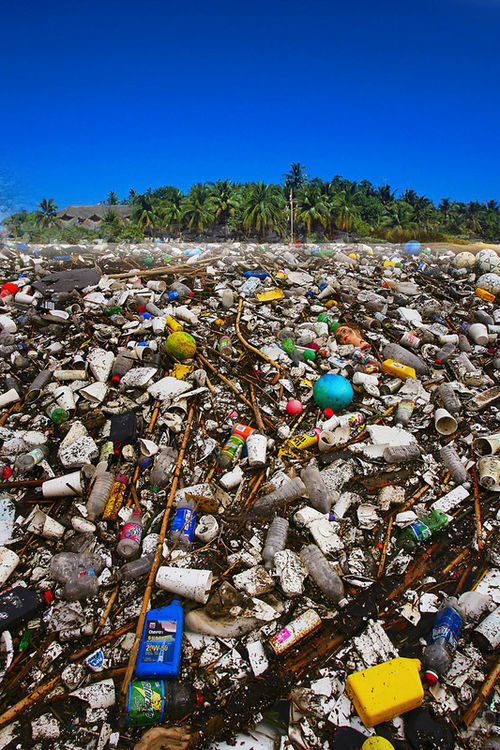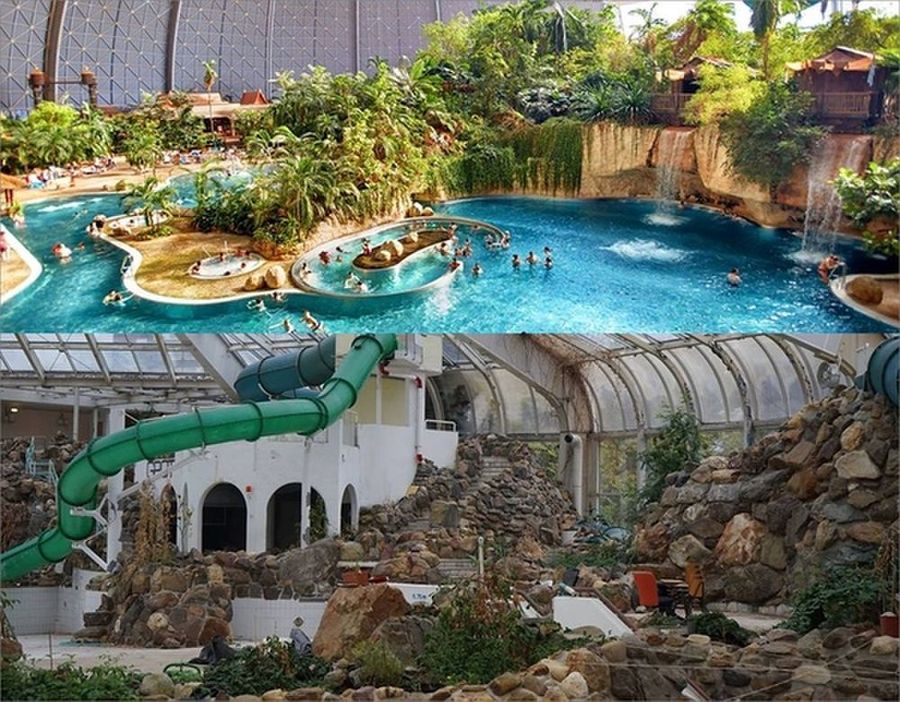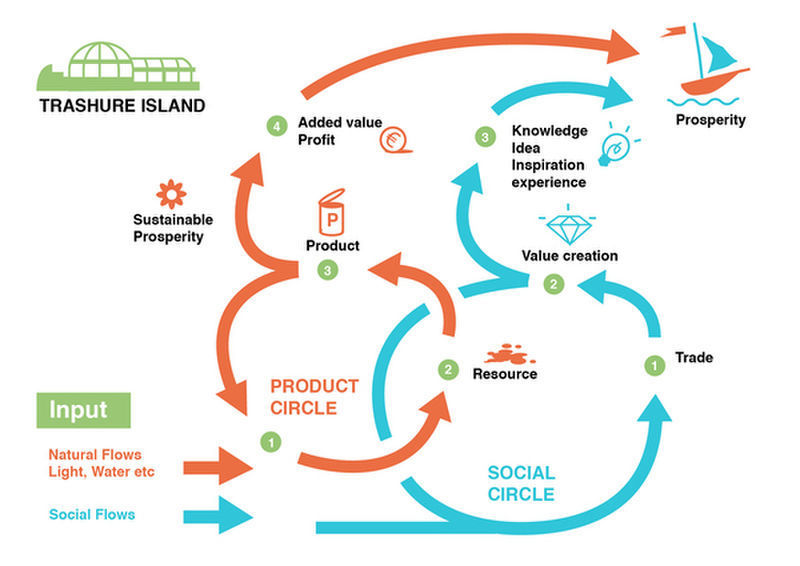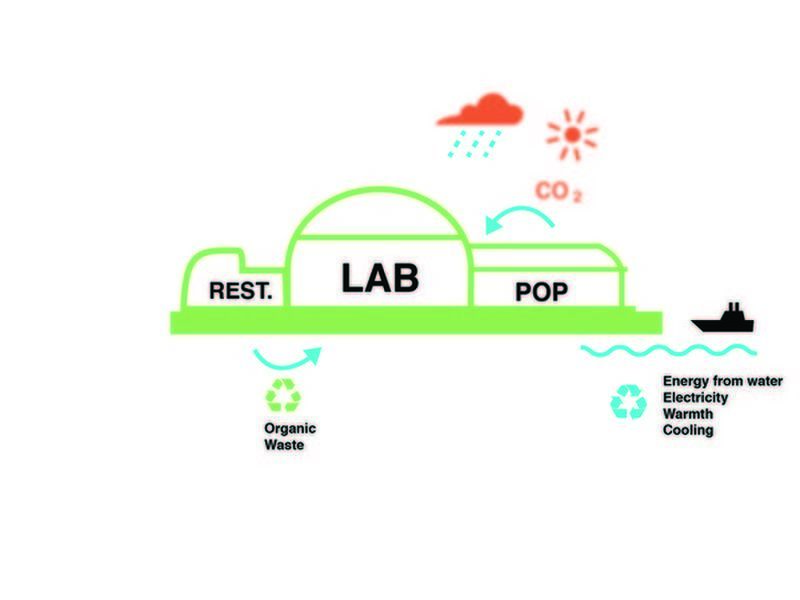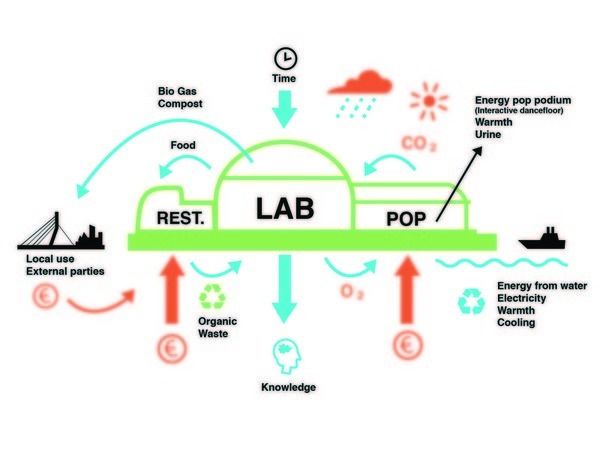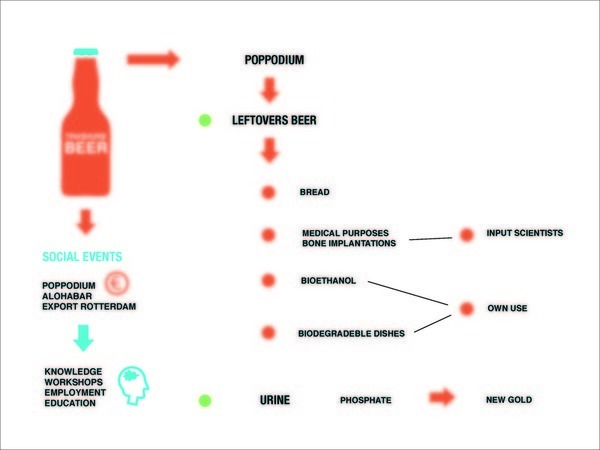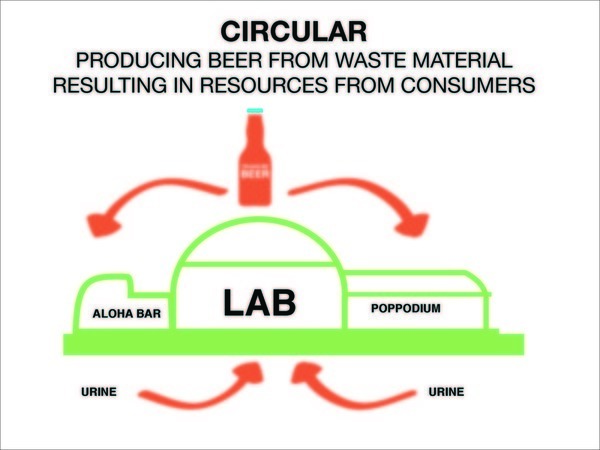Difference between revisions of "Circular Economy"
m (Text replacement - "Category:01_Write_Me" to "") |
|||
| (3 intermediate revisions by the same user not shown) | |||
| Line 245: | Line 245: | ||
A circular economy will be created within Tropicana and with its surroundings. | A circular economy will be created within Tropicana and with its surroundings. | ||
| − | + | ||
| − | + | ||
| − | |||
[[Category:Economics]] | [[Category:Economics]] | ||
Latest revision as of 14:13, 9 February 2017
Contents
the circular economy
Tropicana (1988) used to be an iconic building on the Maasboulevard in Rotterdam, functioning as a recreation resort, to give the people of Rotterdam an opportunity to go on a day trip without spending the night. It was a promise of a tropical experience, a true aquatic paradise. Due to deferred maintenance the building was fined in 2007 by the government, it was not safe anymore to enjoy your morning dive here. Some restoration repairs were done to maintain the happy activities. In the summer of 2010 Tropicana closed it's doors to be renovated to an in 2011 opening Events Hall. That never happened. Eventually a few factors caused bankruptcy in 2011. The aquatic paradise was never to be experienced again, which was and still is a big disappointment by it's visitors.
It looks very different nowadays compared to what it was. Tropicana as well, has become a tropical island which is trashed. A dream is decay. It became a failure because industrialization, business strategies and self-eager money-loving people made the word unable to deal with the consequences. What once was a paradise became a symbol of needed change.
Thanks to:
Mark Slegers & alle medewerkers Rotterzwam, host and inspirator.
Rechtstreex, voor de heerlijke lokale lunch
Norbert Bol, Director of Grondmij capital invest.
Mark Bode, WDKA
Hans Huurman, gemeente Rotterdam
Dave Geensen, poppodium Rotterdam
De deelnemende studenten Bouwkunde minor dIB, Minor social practice WDKA en studenten social economy, erasmus universiteit
Alle betrokkennen van de WDKA
Superuse Studios
Trashure island
During the past century, most cities have become agglomerations of monofunctional districts which are basically disconnected from each other. Residential neighbourhoods, industrial estates, office complexes, farming districts and recreational areas are spatially delimited by administrative boundaries, making it harder to make good use of their mutual presence. The ever-increasing flow of goods, energy, water, food and even capital is disconnected form the location where these are created, contributing to endless transportation, traffic congestion, waste of energy and pollution.
In Trashure island we learned how to promote the exchange between existing flows, by making smart new connections – the main requirement of an ecosystem. You will also be learning which business models are relevant to these strategies.The former tropical swimming paradise Tropicana is now the temporary location for various businesses including a restaurant and a bar, as well as facilities for roasting coffee and farming oyster mushrooms. The host of the master class is Mark Slegers, cofounder Rotterzwam, the local mushroom farming business which grows mushrooms on coffee grounds. This is a working business case which we took as a starting point for transforming Rotterdam’s Topicana into a centre for innovation: sustainable, connecting and regenerative. This Rotterdam landmark is a metaphor for new ways of thinking, sharing, working and relaxing, with an important focus on recycling as well as research into flows of goods, energy, water, food and even capital. The masterclass resulded in connections between local surpluses, shortages and bottlenecks, thus creating new functions and business cases for Tropicana. During the master class, experts in blue economy, finace, city farming and metabolim visit the masterclass in Topicana to share their expertise, to question ideas, and to provide these ideas with ‘feed-forward’.
Concept
There are many problems in the world. One of them is waste. Let´s take the tropical islands for example. When you think of tropical islands, you often imagine white beaches, a clear blue sea and lots of palm trees. However, reality is different. There is a lot of pollution because of the oil industry, the production of plastics but also trash that´s being dumped all around the world. All these waste problems mostly occur from of the linear economy. In the linear economy we produce a lot of products to our needs but we do not care enough about these waste flows. This results, for example in a very different image of our tropical islands. We, the people who produce all this waste, are responsible for the consequences. We are trashing our Mother Earth.
Rotterdam has recently been chosen as main capital of Europe, mainly because the city is a leader in sustainability. Why not use Tropicana as a building that represents sustainable development and give the building the iconic status back?! Tropicana will be Trashure Island, an island which will share and show sustainable ideas, mainly focussing on how to reuse waste flows. This creates a circular economy. It will be an ecosystem consisting of a lab and a knowledge centre where local people can learn by doing and where innovation and experiments can take place. This way the mindset of people can be changed and will be a new kind of educating. This results in BIY: Blue it yourself- economy. The waste flows of the the poppodium, which will soon be in the building, and the restaurant will also be a part of the circular ecosystem. This way, waste flows, trash and unemployed people become the new gold. Trasher becomes treasure again. It is an innovative way of creating awareness for sustainability for the people of Rotterdam and eventually for the rest of the world. This way, people can be introduced to the blue economy in an innovative way of education. This schedule shows how the ecosystem functions and which flows are a part of this system. It consists of a natural and a social flow. The natural flow has an input existing of waste, sunlight, water and air. These flows enter the system and transform into products, made by different stakeholders. These stakeholders can benefit from each other’s products, waste and rest flows. In this way, a circular ecosystem emerges.
The social circle shows how people asinput, create knowledge and experience. The people that participate in the system transform energy into value. This value is very important for the social system of Rotterdam and can eventually reach the rest of the world. The value here is global knowledge, local awareness, and social prosperity trough sustainable thinking.
Architecture
Trashure Island is positioned in the iconic building Tropicana. The location has many special qualities, like the positioning of the building by the Maas. The most iconic element of the building is the glass dome, turning the building into a greenhouse. Because of the vast amount of space there are opportunities for the less fortunate cultures such as housing meetings.
Because of the many possibilities with the available space this will be the ideal place to start an educational lab. The basement is very useful for producing certain types of products with remained parts of the installation of the former swimming pool. The qualities are connected on Trashure Island. If you combine all these qualities, you will get a circular ecosystem in which waist flows will be transformed into useful resources.
The height differences (as seen below) are useful when dividing the available space in areas for walking space and areas for growing products.
Flows of production
Trashure Island profits from natural sources such as the sun, rain and water of the Maas that provide the building of energy and heat and regulates the temperature. The leftovers of the restaurant can be recycled in the lab of Trashure Island and recreated to new products. The time and effort that will be invested in the building will make it possible to produce knowledge for the workers and visitors. This information and knowledge can be passed on to other people and so on.
The restaurant provides waist, urine (from which valuable phosphor can be harvested) and thermic for the lab. The poppodium provides energy and CO2. The dance floor of the Poppodium provides electricity that we use for production in the lab.
The lab provides the restaurant and poppodium of visitors, oxygen, food, drinks and energy.
Trashure Island generates food, drinks, compost, biogas (for cars) and knowledge for the people. Money is generated when visitors who pay an entrance fee and when what is produced is sold to small businesses and individuals.
Subdivision of space
The area under the dome can be turned into a greenhouse and thus be made more attractive for visitors. The swimming pools could be used for production cases for plants or house water with fish that can be used as compost or food for later use elsewhere in Trashure Island. The more multi-functionality is mixed within the lab, the better a circular ecosystem could be realized. Examples of using the swimming pool are shown in the drawing.
File:Mcce subdivision space.jpg
Program
After subdivide all participants into four different groups, program group had the task to think about processes that could be placed within the concept of Trashure Island. Tropicana was once an icon and we would like to give the iconic status back in a different way.
We figured the ability of the Tropicana building was like a greenhouse, because of the dome of glass and the capability of the basement to storage and filter rainwater.
We will explain different processes and projects that we could put in the building of Tropicana. We had a few possibilities that we could apply there. First of all Trashure Island will serve as an institution with lectures, what could educate people and companies from Rotterdam. Trashure Island will become a hatchery of knowledge. • Tropicana: serve of basic need of clean water, fresh air and fertile soil.
Institution - lectures - 1:1 experiment
- Biofuel
- Algen
- Bioplastic
- Potato peelings
- Coffee grounds
- Corn
- Sugar
- (Rain)Water
- Filtering
- Plants/ food/ fish
- Energy
- Mushrooms (Rotterzwam)
- Material/food
- Packaging made of mysellium
- Moss
- Algae
- Light
- Filtering the air
- Isolation
- Energy
- Kombucha
- Leather → no chemicals needed
- Water, green tea, sugar, piece of Kombucha.
- Growing process (30 degrees)
- Cycle process/recycling
- Livestock -> eating remains after harvest instead of healthy plant
- Ecosphere
- Solar panels / windmills
- Paper made out of stone
- Excreta -> compost
- Burning the litter -> use heat
- Wood chips (normally burnt) -> growing plants
- Smart food storage
- Natural drinks
- Excreta
- Beer of potato peelings.
- Natural cleaning products
- Orange peelings
- Spider webs -> textile bulletproof skin
- Viscose (Snailpoop) textiles
- Soda cellulose
- Tropicana agriculture
- Insect cultivation
Ecosystem
An already existing concept is Aquaponics. This is a food production system that creates an ecosystem with the vision less is more. You can create a closed ecosystem where the only thing you will need is sunlight, water and air.
Now in our system we have the advantage that we can use the waste of the city Rotterdam. Now you will get even more products with no costs whatsoever. For example: Beer made out of leftover bread and sugars from leftover fruits. The only thing you will have to add is water and with that you can make your own Trashure Beer.
If you have a working ecosystem the basic needs are sunlight and rainwater to produce products. We will also have the luxury to use the leftover food from companies in Rotterdam. These leftovers will be divided in two groups.
Food that is still useable will be served in the Aloha bar and you can be used for certain products. For example you can use orange peel, coffee –grounds, fruits, potato peels etc.
And the second group will be food that has started to rot witch can be used as compost for farming.
We will collect rainwater from the 10.000 m2 roof surface witch will filter and use in our products as well as for farming. Animals like chickens, fish and insects will live in our ecosystem and we can also harvest products from them.
Waste from Rotterdam Next to the ecosystem we will process waste. Such like biological waste what we will compost if it’s rotten or give a new life as meal. In this way we make treasure from trash. There are a lot of supermarkets, restaurants, school and house holdings in Rotterdam which throw away on date or damaged food. We could collect that by ‘bakfiets’ and we will process it in Tropicana. In our lab we will classify the food as edible or compostable. The meals could be served to less fortunate people and the compost will we use for growing our own vegetables / agriculture.
Case study, Trashure beer
Social
How can this ecosystem create value for the society? By addressing bad habits from individuals we can reduce waste (tangible and intangible) and increase knowledge and awareness.
Surpassing dominant organizations in the industrial process and focusing on local and sustainable production.
Create a win-win-win-win situation: cheaper, local and sustainable production in a circular economy. For people to take responsibility of their whole company or household. Creating a knowledge center for experimentation and education. Give people the tools to take responsibility and reduce their waste themselves.
What’s the problem
The problem is waste. We use our resources and throw away products that can be used again.
There are all kinds of wastes.
- Products;
- Time;
- Talent;
- Rest-energy;
- Location.
Who are we going to help Lots of people have a waste problem. This ecosystem will be for:
- Citizens who want to have a more sustainable lifestyle and save money in the process;
- Local citizens who are unemployed or have a low income;
- The society;
- The youth;
- Companies.
How can we help them Tropicana will serve as a platform of regeneration.
This will be done through:
- Social events. Like tours of workshops;
- Creating Jobs;
- An open source knowledge center. Everything that’s produced here e.g. products and knowledge will be open to everyone.
The unemployed and the “less fortunate”: We will make local citizens aware of their waste problem. For example, when they are financially short at the end of the month we will give them Re- and upcycle tools to help them save money. The way they view their trash has to be turned around in seeing it as a resource. By giving them jobs throughout the whole circular production process, the time they create waste at home: in both talent, energy and in terms of resources, will be reduced.
A Possible idea: a form of ‘deposit fees’. Show them the value of their waste. To turn this into action they need proof that it really saves money. Show them a fun, easy and accessible way to do this.
Within the ecosystem there is room for initiatives by anyone who sees them.
Companies The local companies pay to get rid of their waste. This ecosystem would like to take those waste products for free. This is an advantage for both parties. Besides that, the involvement in sustainable and blue economy activities might be good for the brand and image of these companies.
Entrepreneurs can start a business here when they have an idea that fits within the ecosystem.
IK HEB DIT ARTIKEL een nieuwe naam gegeven: Trashure Island, a proposal for a circular economy in Tropicana Deze page kan dus verwijderd worden! Iris
Because of the advantages there could be support from the municipality. Local can get incentives to support this ecosystem, for example through tax incentives.
Knowledge and Education A lot of things are still unknown within the bleu economy. There is a lot of room to grow. There will be room for scientists to come up and test new ideas.
The knowledge that is produced within this ecosystem will be exchanged with the outside world. Children are the future. This is why it’s so important that they will be educated about the circular and blue production process.
Knowledge will be shared through workshops and by creating a podium for discussions and debates.
Tourism This new way of production could also attract a new kind of tourists. This eco-tourism will consists of people who love to see the idea of bleu economy in reality. In the long-term this could turn into the demand for (eco)hotels, food and souvenirs.
Business case Everythin will come together in our business case.
Tourists and companies bring income as money and get information and knowledge in return. Unemployed people give time and get knowledge in return. Schools can come so the youth can be educated. Products produced in Tropicana can be sold. A circular economy will be created within Tropicana and with its surroundings.
